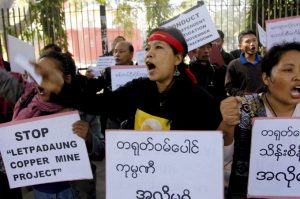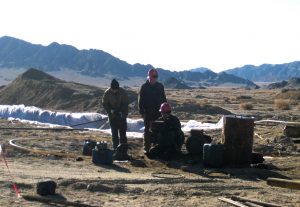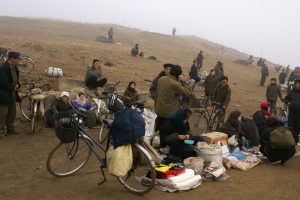Unsettled Remains: Tensions over Unrepatriated Bodies from the Asia-Pacific War
The “remains issue” (ikotsu mondai) refers to controversies surrounding the bodily remains of Korean and Chinese nationals who died during the Asia-Pacific War in Japan and whose bodies have not yet been repatriated. Most were conscripts: soldiers, military personnel and forced labourers. After the War, the remains of Chinese forced labourers were largely repatriated to the bereaved families, but it is estimated that as many as two thousand Korean bodies may still be stored at temples and buried across the country.
The Politics of Mining in Mongolia and Burma/Myanmar
Protests against mining projects reveal contrasts in the political impact of resource extraction in Mongolia, an established 23 year-old democracy, and Burma/Myanmar, a liberalizing authoritarian state. Two similarities are apparent in the domestic tensions surrounding Mongolia’s Oyu Tolgoi and Burma’s Letpadaung copper mines: both governments and populations are keen to balance Chinese influence in their economies; and both struggle to balance development goals with local grievances. Yet, the differing role of the countries’ politicians means that the protests have different outcomes.
Island Connect in the Tuamotus: Satellite, Solar Power and Civil Society
Despite their isolation, technological developments allow residents of Katiu, a tiny coral atoll in the Tuamotu Archipelago of French Polynesia, to engage as global citizens. The atoll is only 10 square km, 27 km long and 12.5 km wide. Its 286 residents subsist on fishing, copra harvesting and pearl farming. There is no tourism trade, and anything beyond coconut palms, breadfruit, taro, fish, seafood and some fruit must be imported on infrequent cargo ships. Until recently, the atoll was inaccessible except by boat, and islanders had limited communications with the outside world.
Reflections on Japan (Video Interview with Sir David Warren)
Recent territorial disputes point to tensions in the relationship between Japan and China. Competition extends beyond issues of history and territorial assertions to competition for resources and influence. Yet it is increasingly recognized that Japan and China are crucial to each other.
State Formation and Contemporary Mongolia (Video with Dr. Robert Bedeski)
States are a paradox. On the one hand, with a monopoly on the use of force, they provide security, but on the other the formation of the state is often accompanied by violence.
The example of Mongolia is an interesting demonstration of this. Genghis Khan’s unforgiving destruction of enemies shows state formation to be brutal, but this was accompanies by the development of the rule of law and a written language, through which the nation developed.
Why are Foreign Mining Companies Retreating from China?
In the 1990s, China opened up the country’s vast mineral resources to international investment. Over the past decade, it has reformulated its mining legislation to attract foreign companies into the Chinese mining sector with the hope of speeding up its modernization. Between 2001 and 2004 the number of foreign mining projects quickly increased from 150 to 279. But by 2010, this number had declined to 92. International firms continue to feel stymied by an inconsistent and convoluted mining policy and their inability to create relationships of trust with local mining stakeholders.
Elections, Illiberal Politics & Sectarianism in Pakistan: Pogroms against Hazara Shia
Pakistan will hold national elections in May 2013, marking the first time a civilian government completes a full five-year legal term. No small achievement for a nation that since 1947 has been marked by military coups and weak civilian rule. There are reasons to feel encouraged: constitutional reform promoting more balanced center-provincial institutional and political architectures, a media operating with fewer restrictions, and an increasingly independent judiciary all point toward the possibility of genuine consolidation of democracy. But the path ahead is challenging. The resurgence of sectarian violence and an electoral alliance between a key national party and sectarian militants points to a new dynamic.
The British and Occupied East Timor: Support for Indonesia Behind a Façade of Neutrality
As late as 1996, a British National Audit Office Report corroborated the government version of Britain as an honest broker in East Timor’s struggle for self-determination under Indonesian occupation, which followed the end of Portuguese colonial rule in 1974 and Indonesia’s invasion of the territory in 1975. But recently released archival evidence refutes the claim that Britain was negotiating a diplomatic solution between Indonesia, Portugal, and East Timor.
Bureaucratic Red Tape Chokes Free Markets in India
India auctioned 3G licenses for USD $14.78 billion in 2010, a bonanza for a government staring at a large fiscal deficit and trying to promote inclusive growth through a host of populist social schemes. With new telecom auctions scheduled soon, the government hopes to generate more money to pare its fiscal deficit, and bolster its reformist credentials to foreign and domestic investors.
Post-socialism, North Korean Style: With State Economy in Ruins, Workers Look Elsewhere for Employment
North Korea is often described as the “world’s last Stalinist state,” but this is misleading. While the facade of a Stalinist economy remains visible in Pyongyang, the nation’s capital, the socialist regime has long become an empty shell. The North Korean economy is now dominated by legal, semi-legal, and entirely illegal private enterprises that provide employment for workers who have failed to make ends meet in the formal economy. As such, it more closely resembles a post-socialist Eastern European economy than a Stalinist one.









